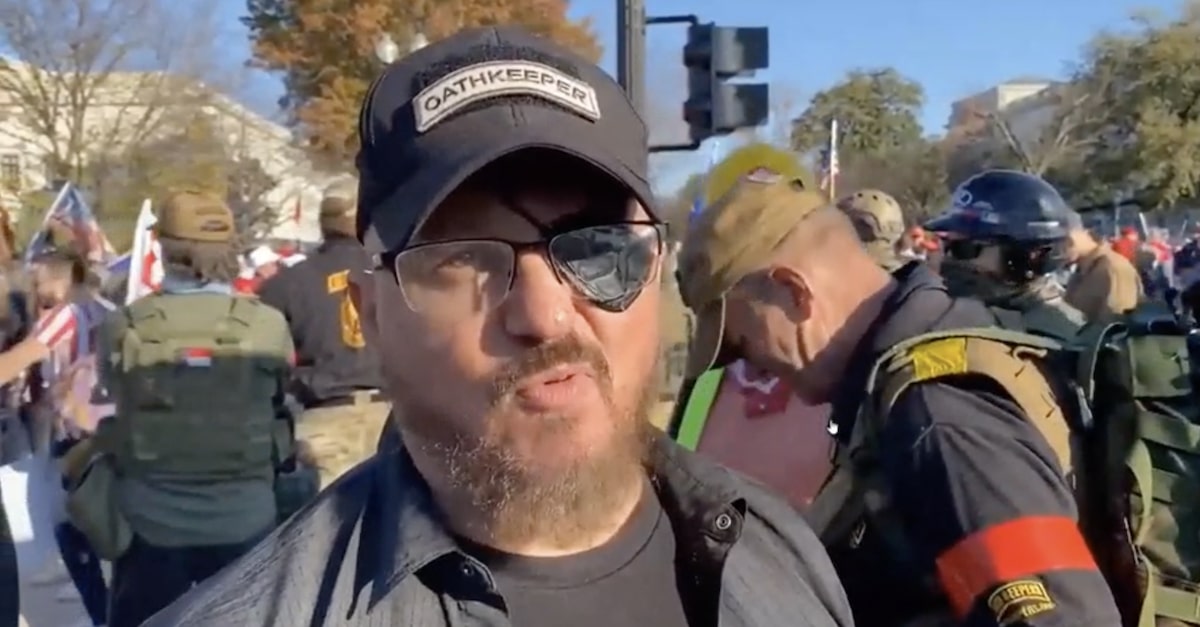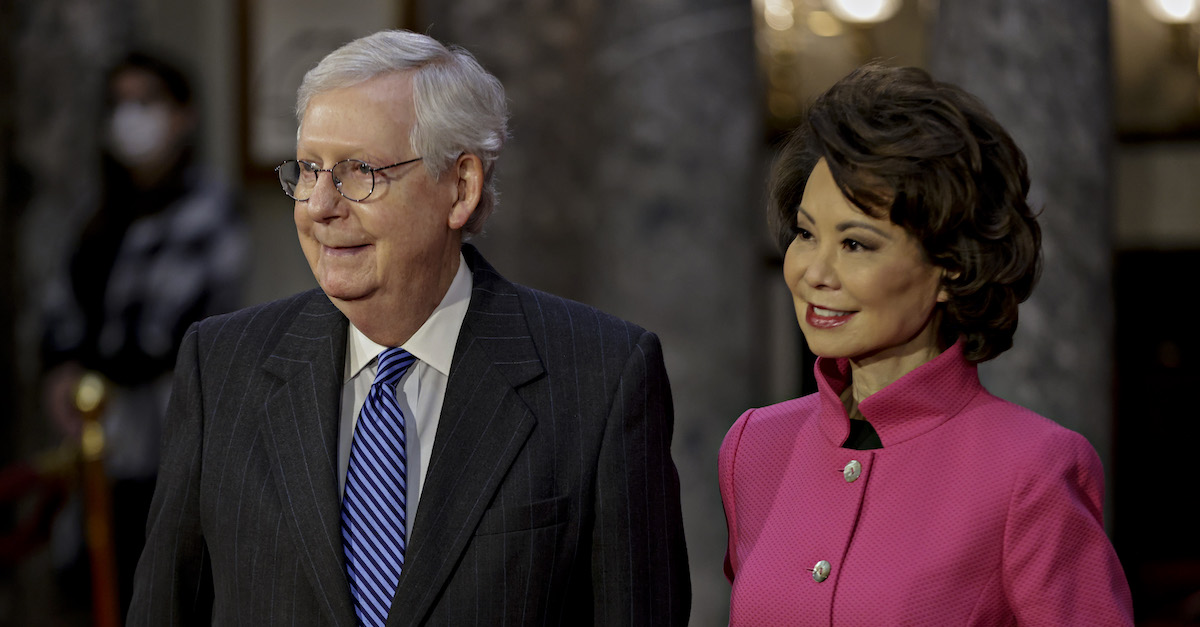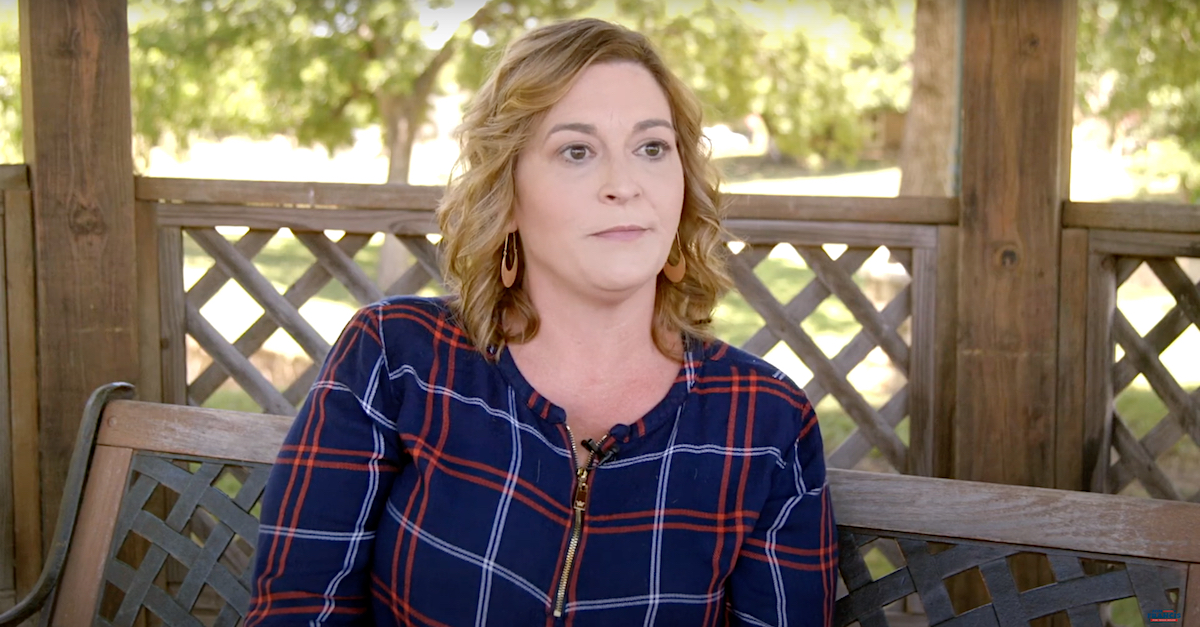
Oath Keepers leader Stewart Rhodes is seen in a still frame of a video played during his seditious conspiracy trial. (Image via DOJ)
As cross-examination of Oath Keepers founder Stewart Rhodes kicked off in his seditious conspiracy trial on Monday, a federal prosecutor highlighted the group’s revolutionary imagery of armed opposition to the government — right up to its founding.
Rhodes tried to paint a softer image of the Oath Keepers group when he first took the witness stand on Friday. He denied that it was racist or extremist and asserted that he founded it in opposition to George W. Bush-era policies regarding military commissions and enemy combatants, comparing the Supreme Court upholding such laws to Japanese internment.
Assistant U.S. Attorney Kathryn Rakoczy noted at the start her blistering cross-examination, however, that the Oath Keepers’ founding came years later, shortly after President Barack Obama’s election. She added that he launched at Lexington, Mass., on April 19, 2009 — the anniversary of the “shot heard ’round the world.”
Rokoczy then showed a jury footage of Rhodes unpacking that imagery and history on the show of Alex Jones, the far-right conspiracy theorist who founded InfoWars.
Rhodes denied that invoking this American revolutionary history represented an endorsement of armed opposition against the U.S. government, despite pointedly launching the group at that date and location.
“That’s Not Going On”
The prosecutor also elicited Rhodes’s anti-Chinese sentiment through his distrust of then-Senate Majority Leader Mitch McConnell, whose wife the paramilitary group leader looked upon with a wary eye.
“Because he’s married to a ‘Chinese national,’ correct?” Rakoczy asked, referring to Trump’s ex-U.S. Secretary of Transportation Elaine Chao.
“In part,” Rhodes conceded, adding, falsely, that she’s tied to the Chinese Communist Party.

Senate Majority Leader Mitch McConnell (R-KY) waits to be sworn-in with his wife Elaine Chao, U.S. Secretary of Transportation, at the U.S. Capitol on January 3, 2021 in Washington, D.C. [image via Samuel Corum/Pool/Getty Images]
According to prosecutors, the manner of the Oath Keepers’ founding set the tone for events to come from the late aughts all the way through the attack on the Capitol. Rokoczy noted that law enforcement asked the Oath Keepers to leave after they showed up in Ferguson, Mo. in 2014, during the racial justice protests after the death of Michael Brown. A photograph entered into evidence at that protest shows a heavily armed Oath Keepers member standing on a rooftop with a large rifle, and the prosecutor said he was asked to leave.
Later showing footage from another racial justice protest at Lexington, Ky. — following the fatal shooting of Breonna Taylor. Video showed protesters yelling at and criticizing the Oath Keepers for their presence there. Rhodes’s lawyer claimed that those demonstrators had been brutally accosting his client, but the prosecutor said the footage showed a different picture.
“That’s not going on, is it?” Rakoczy asked.
Rhodes said he was being accosted because the crowd told him “F- you!”
The prosecutor noted that other Oath Keepers in the video, in response, have their guns out, including one of the five co-defendants in the case: Florida Oath Keepers chapter leader Kelly Meggs.
Earlier in the day, Rhodes claimed during direct-examination by his own lawyer that he did not know that his members stormed the Capitol on Jan. 6th until after the fact — and insisted that he didn’t know the armed “quick reaction force” that stood by in Virginia, either. He portrayed it as just members of the Oath Keepers obeying the law by stashing their firearms outside of Washington, D.C., city limits.
“Was there a plan to come in to disrupt the election?” Rhodes’s attorney Phillip Linder asked him on Monday morning.
“No,” Rhodes replied, laughing.
“Really Pull a Coup”
The prosecutor noted, however, that Oath Keepers arrived heavily armed.
“You personally, how many rifles did you bring?” Rakoczy said.
“Two,” Rhodes replied, adding when asked that he also brought sidearms.
Rhodes also agreed that he brought hundreds of rounds of ammunition.
Evidence showed that this stash of weapons was to be used in service of a quick reaction force, which would wait on standby if needed across city limits — or if Trump deputized the Oath Keepers — on Jan. 6th. The Oath Keepers deny that was its purpose, but Rhodes was confronted with messages from him about it.
The prosecutor grilled Rhodes about his speeches urging Trump to invoke the Insurrection Act, which the Oath Keepers believed would allow the former president to militarize paramilitary groups. Rhodes also asked Trump to engage in mass declassification, an effort that apparently sprang from a QAnon-style belief in government participation in child exploitation.
“Is this the data that was going to expose government officials of being pedophiles?” Rakoczy asked.
“Yes, or other crimes,” Rhodes said.
Though he claimed he would oppose storming the Capitol because it exposed his members to legal jeopardy, Rhodes did not denying meeting with a person days later in an effort to deliver a message to then-outgoing President Donald Trump, though he blamed some of his rhetoric on having had a “couple drinks.”
“I was concerned about what I saw happen in 2020 and concerned about the same agenda to really pull a coup,” said Rhodes, apparently referring to the lawful presidential election rather than the violent attack on the U.S. Capitol.
“She Switches to a ‘Sub'”
Before resting their case, prosecutors called Rhodes’s would-be intermediary to Trump: Jason Alpers, a military veteran who secretly recorded Rhodes talking about civil war and fantasizing about hanging House Speaker Nancy Pelosi (D-Calif.) “from a lamppost.”
Rhodes likewise did not dispute that he typed the message that Alpers said he wanted to deliver to Trump, urging the then-president to militarize his paramilitary groups to help him seize power by force.
“You must use the insurrection act and use the power of the Presidency to stop him,” Rhodes told Trump in the message. “And all us veterans will support you and so will the vast majority of military.”
The prosecutor ended her cross-examination with an audio recording appearing to lament that the quick reaction force didn’t deploy.
“My only regret is they should have brought rifles,” Rhodes said in the recording on Jan. 10, 2021.
The Oath Keepers leader suggested that was the booze talking.
“Yes, I did say that,” Rhodes said. “Yes, after a couple drinks, and I was pissed off, yes.”
That conversation took place days after the attack on the Capitol on Jan. 6. Shortly after that date, Rhodes said, the Oath Keepers’ purported lawyer Kellye SoRelle waxed “conspiratorial” about what was going to come. Rhodes said that he remained calm because he’s had extensive experience as a longtime “dissident.”

Kellye SoRelle is seen in a screengrab from a Jon Francis campaign video on YouTube.
The prosecutor noted, however, that he functioned openly as the leader — and head of the Oath Keepers board for life — for more than a decade and made his living exclusively off that.
“Isn’t it true you’ve been living off the Oath Keepers for the last decade?” Rakoczy asked, after quoting Rhodes claiming that he wasn’t in it for the money.
“Sure,” Rhodes replied.
A Yale Law-educated attorney, Rhodes is now disbarred in Montana, and he supposedly hired SoRelle to manage the Oath Keepers’ legal affairs. But evidence showed that they’re relationship extended far beyond the attorney-client kind.
Confronted with that evidence, Rhodes acknowledged openly: “Well, we were dating.”
After the prosecutor asked whether he exerted some control over SoRelle, Rhodes cracked a self-satisfied grin and replied: “Do we have to get into kink, really?”
He then added: “Outside the bedroom, she’s definitely a ‘type A.’ Inside the bedroom, she switches to a sub.”
SoRelle now separately faces charges on Jan. 6th-related crimes.